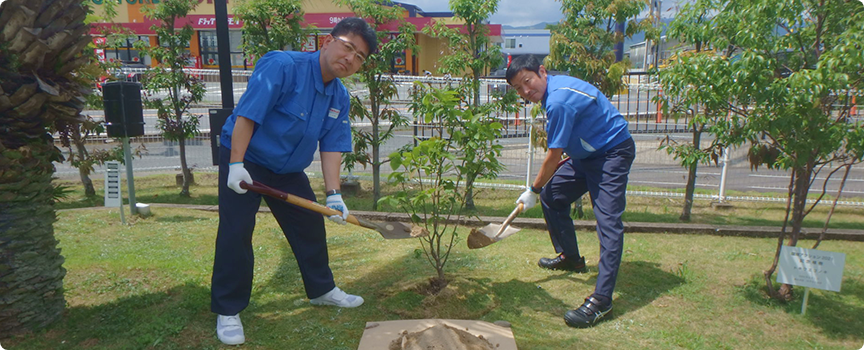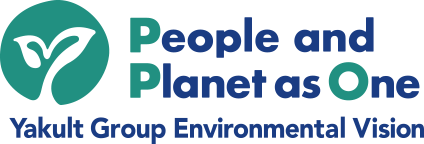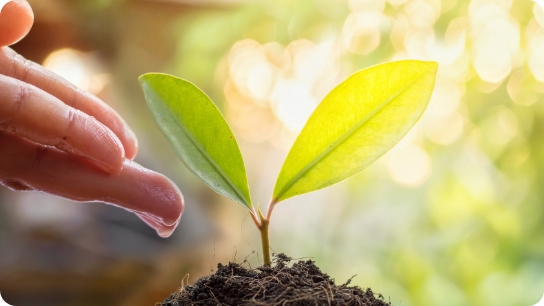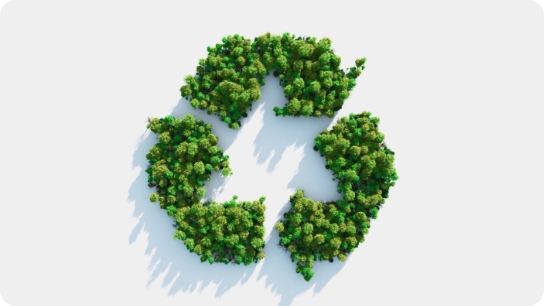Environmental

"In order for people to be healthy, everything around them must also be healthy."
This slogan embodies Yakult's belief that everything on the Earth, from the natural environment to society itself, must also be healthy to ensure our human well-being.
Uniting both "People and Planet as One."
Since its founding, Yakult has been devoted to preventive medicine, which aims to help people avoid sickness.
We take this the same for approach with the environment.
We strive to conduct our corporate activities without impacting the environment, and pursue a society where people and the planet can co-exist as one, both now and into the future.

Environmental Vision 2050
To realize a society where people and the planet co-exist as one through a value chain that has zero environmental impact
Our goal is to achieve Net Zero Carbon by 2050 (in Scope 1, 2 and 3).
Environmental Targets 2030(Revised May 2025)
As a medium-term milestone toward achieving Environmental Vision 2050, we have established Environmental Targets 2030 with a global scope in mind, and are pursuing initiatives accordingly.
| Environmental targets | Initiatives | |
|---|---|---|
|
|
Initiatives |
Scope:Corporate headquarters and all domestic and international consolidated subsidiaries
|
|
|
Initiatives |
|
|
|
Initiatives |
|
|
|
Initiatives |
|
*FLAG : An acronym for Forest, Land, and Agriculture. It encompasses emissions from land use changes and land management
Environmental materiality
Basics efforts
Message from the chief officer
Hiroyuki Kawabata
Director and Managing Executive Officer
Divisional General Manager of Management Support Division
Yakult’s approach to environmental initiatives
The Yakult Group strongly believes that “in order for people to be healthy, everything around them must also be healthy.” Human health depends on the health of the water, soil, air, plants, animals and the societies that humans create—in other words, the health of the Earth itself.
Driven by this belief, we formulated the Yakult Basic Policy on the Environment in 1997 and have carried out environmentally responsible business activities ever since. In recent years, environmental issues like climate change and ocean plastic pollution have become increasingly grave, with major effects on human health and lifestyles. As a group that does business in 40 countries and regions around the world, we recognize that we have a major environmental impact as well.
We believe it is our responsibility to contribute to the realization of a sustainable society and grow our business sustainably by resolving environmental issues through business activities.
Advancing the Yakult Group Environmental Vision
In 2021, we established the Yakult Group Environmental Vision with the aim of uniting people and planet as one. This document sets out Environmental Vision 2050: our ideal vision of the future, in which we achieve net zero Scope 1, 2 and 3 carbon emissions by 2050 in order to realize a value chain that has zero environmental impact. To ensure that we pursue effective initiatives based on this vision, we also used backcasting to formulate Environmental Targets 2030 and Environmental Actions (2021–2024). We are currently revising Environmental Targets 2030 and working on a new Environmental Actions document to cover fiscal 2025 and beyond as we aim to balance business development with consideration for the environment.
In order to realize our ideal vision of the future as set out in the Yakult Group Environmental Vision, we established a department in 2022 to facilitate our actions related to the environment. This department plays a central role in strengthening activities within the Group, building cooperative relationships with companies outside the Group, and collaborating with relevant government and municipal bodies.
Here I will offer some specific examples of our initiatives. Within the Group, energy for manufacturing was switched entirely to renewable energy at 13 plants in Japan, helping reduce our greenhouse gas (GHG) emissions. We also endorse the recommendations of the Task Force on Climate-related Financial Disclosures (TCFD)* and disclose our Group’s responses. Climate change has become a pressing matter for the entire world, and we will continue our sincere efforts to address it.
In order to reduce the amount of plastic we use, or increase the proportion that is recyclable, we have switched to straws incorporating biomass plastic for some products. Our resource recycling initiatives also include used plastic container collection experiments with other companies in our industry.
The increasing severity of environmental pollution due to plastic is driving stronger regulations on plastic around the world, and we will continue to track regulatory movement across countries and regions and consider how to respond.
* The TCFD was established by the Financial Stability Board following a request from the G20 to develop more effective climaterelated financial disclosures through their existing reporting processes. It released its final report in 2017, which recommended that companies and other organizations disclose climate-related risks and opportunities in four thematic areas: governance, strategy, risk management, and metrics and targets.
For the sustainable future of Yakult and the world
In order to achieve the Yakult Group’s goal of uniting people and planet as one, it is important for all of our workers to recognize their personal connection to environmental issues and take action accordingly. At the same time, we believe that coordination with external as well as internal stakeholders is essential. By raising environmental awareness among workers and continuously communicating with suppliers, we can share our vision of the world and act to resolve environmental issues across the entire value chain.
We believe that making a positive impact on the global environment and continuing to strive toward that while contributing to our customers’ health through our products will lead to a sustainable future for both Yakult and the world. We will continue striving to apply our belief that “in order for people to be healthy, everything around them must also be healthy,” retain the trust of our stakeholders, and remain a widely loved company.
November, 2024
- Home
- / Sustainability
- /
- Environmental



